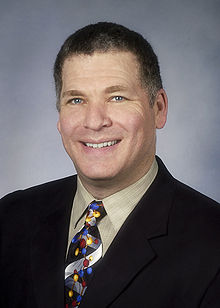Jeremy M. Berg
Jeremy Berg | |
|---|---|
 | |
| Born | April 10, 1958 |
| Alma mater | Stanford University Harvard University |
| Scientific career | |
| Institutions | Science University of Pittsburgh Medical Center National Institute of General Medical Sciences |
Jeremy Mark Berg was founding director of the University of Pittsburgh Institute for Personalized Medicine.[1] He holds positions as Associate Senior Vice Chancellor for Science Strategy and Planning and Professor of Computational and Systems Biology at the University of Pittsburgh. In 2016, Berg was named editor in chief of the Science journals.[2]
Previously, Berg served as director of the National Institute of General Medical Sciences (NIGMS) at the National Institute of Health (NIH). He was also formerly a professor at the Johns Hopkins University School of Medicine, Director of the Department of Biophysics and Biophysical Chemistry[3] and author of several books, including the textbook Biochemistry. Biochemistry is currently at its seventh edition and is widely used by many universities. He co-authored the book with John L. Tymoczko and Lubert Stryer and Principles of Bioinorganic Chemistry with Stephen J. Lippard. He received the American Chemical Society ACS Award in Pure Chemistry in 1993. He is widely known for his work on zinc finger proteins including his successful prediction of the three-dimensional structure of TFIIIA-type zinc finger domains prior to the experimental determination of their structures.
In July, 2011, Berg left his position at the NIH to become the Associate Vice Chancellor for Health Strategy and Planning at the University of Pittsburgh and to take the role of professor in the University of Pittsburgh School of Medicine’s Department of Computational and Systems Biology. Berg followed his wife, Wendie, to Pitt where she became a professor in the School of Medicine’s Department of Radiology.[4]
In 2012, Berg was elected president of the American Society for Biochemistry and Molecular Biology.[5] and he served in this role until 2014.
Berg has bachelor's and master's degrees from Stanford University and a Ph.D. from Harvard University.[6]
References
- ^ "Jeremy M. Berg, Ph.D., Named Director of New Institute for Personalized Medicine". UPMC press release. Pittsburgh, PA. 2013-01-04.
- ^ Vence, Tracy (May 25, 2016). "Jeremy Berg Named Editor of Science Journals". The Scientist. LabX Media. Retrieved May 28, 2016.
- ^ S.J.Lippard & J.M.Berg, Principles of Bioinorganic chemistry, cover
- ^ Sandler, Katherine (2010-12-06). "NIH official to take Pitt position next year". The Pitt News. Pittsburgh, PA. Retrieved 2010-12-07.
- ^ "Members of the ASBMB Council".
- ^ biological sketch of Berg from the NIGMS page
